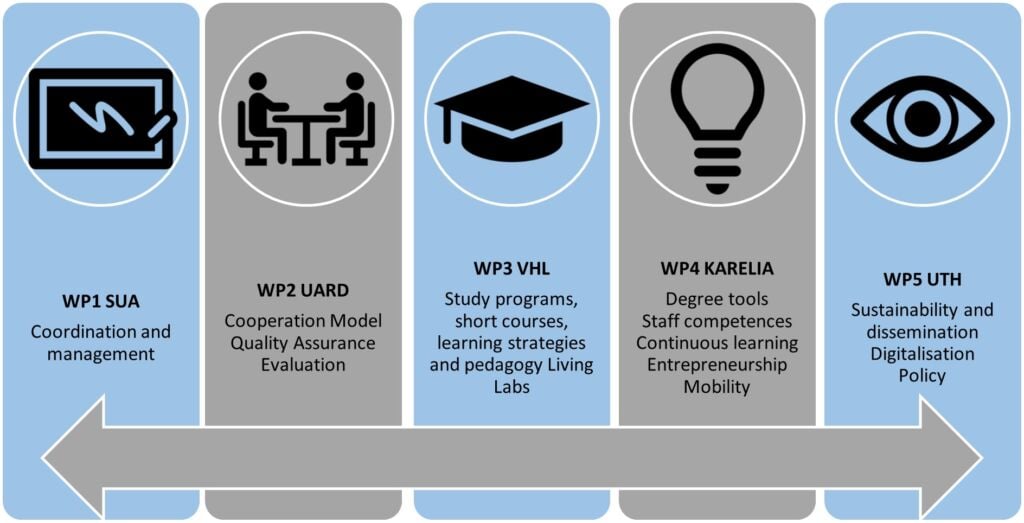Erasmus+ European Universities is a flagship programme developing higher education in a more ambitious and holistic manner than ever seen before. The programme sets goals high: the alliances are expected to reshape the higher education programmes to meet the ideal of the European degree, create a completely new kind of physical and virtual inter-European campus enabling students and staff to work, learn and do research together, and build research, development and innovation (RDI) communities that can mitigate European challenges and promote sustainability (European Universities Initiative).
Thus, the alliances are to both contribute to the European Education Area following the conclusions of the European Commission (EC), and to implement the aims of the European Research Area in their RDI, creating applicable showcases that any other higher education institute can benefit from. Fortunately, the EC acknowledges that the challenges and ambitions set for the alliances do take time, and has set a programme framework that offers three funding calls with 3 + 4 + 2-year opportunities for each alliance. When successful, proceeding with the alliance’s specific aims and objectives, and showing concrete results, the funding may even cover a period of nine years, providing a remarkable opportunity to make a real change (Conclusions on European Universities 2021; European Universities Initiative).
Karelia University of Applied Sciences has been part of the INVEST European University alliance since 2020 and is close to the end of the first period of funding and revising strategy for INVEST 2.0 to be ready for the coming call. What is this all about and why are we involved? This article provides a brief overview reflecting INVEST’s key objectives and workplan,
and discusses the added value of the European Universities programme.
Introduction
INVEST, the Innovations of Regional Sustainability European University Alliance, is a consortium of five pioneering universities: Slovak University of Agriculture in Nitra (SUA, Slovakia, coordinator), Karelia University of Applied Sciences (Karelia, Finland), University of Agribusiness and Rural Development (UARD, Bulgaria), University of Thessaly (UTH, Greece), and Van Hall Larenstein University of Applied Sciences (VHL, the Netherlands).
The coordinator envisaged the European University programme to meet its strategic internationalisation goals and started to build a group of partners with similar interests to join the consortia. To be even stronger during the next programme stage, INVEST plans to extend the group of partners up to seven or eight for the coming 2023 call. For Karelia, the INVEST partnership was a perfect match from the first request: the key areas resonated beautifully with the Karelia2030 strategy goals of promoting internationalisation of education, boosting international RDI and providing opportunities for internationalisation for all. INVEST was funded in 2020 and ranked high, with 90 points.
Following the vision, INVEST enhances the sustainability and inclusiveness of the partner regions, promotes innovation in the education system and research methods, and invests in students to become active citizens and future shaping professionals for a more sustainable Europe. The alliance has four strategic pillars: (1) Competitive education and valuable learning outcomes, (2) collective excellent research and innovation, (3) high mobility levels beyond Europe, and (4) networking as the platform for future education and research, covering the three main focus areas – the Water, Energy Food and Environment Nexus, Quality of Life and Entrepreneurship.
It is quite an ambitious, somewhat abstract and high-reaching vision, isn’t it? Yet it isstill achievable in time when considered from the objectives and action plan perspectives.
INVEST objectives and action plan
To turn the vision into living reality, INVEST has six key objectives to work with. The key operational areas are related to the main challenges that have to be resolved to be able to meet the European Education Area aims. Thus, the INVEST objectives are: definition of joint governance of partner universities; identification of tools for mitigating challenges in joint degree accreditation; systemic joint degree curriculum and implementation programme and facilitation of other non-degree learning opportunities; joint promotion and facilitation of student and staff mobility in physical, virtual and hybrid forms; elaboration of joint, research-intensive, but work-relevant pedagogy; and, finally, living lab establishment or/and shared operational living lab working rules into all partner regions to serve the needs of education and joint research, development and innovation actions (see Table 1).
Table 1. INVEST key objectives (INVEST project proposal, 2020, 11)
| Theme of the objective | Description |
| (1) Governance Structure | Creation of democratic governance structure in which managers, staff and students determine together in close consultation with stakeholders the content and future of INVEST. |
| (2) Joint European Accreditation System | Development of a joint INVEST Accreditation Framework for degree courses (BSc, MSc and PhD) to overcome the differences between the different accreditation systems. |
| (3) Joint Degree Programmes | Development of joint European degrees, and creation of links from vocational training to higher education. Demand-driven, participatory applied research projects conducted in so-called living labs and results from other current scientific research will be an integral part of the educational programmes that will be developed. Automatic recognition of study credits by the home university is another goal for the use of this tool. |
| (4) Mobility of Staff and Students | Foresee the implementation of physical, virtual and hybrid mobility, where students from BSc, MSc, PhD lifelong learning programmes, and staff can move to/stay at another university to study, teach, do research, work, or share services and experiences, in the spirit of the joint European education policy. Mobilities will be facilitated through INVEST Virtual Campus. Mobility will also be strengthened through participation in winter and summer schools. |
| (5) Joint Vision on Education and Pedagogy | Design and implementation of new, appropriate, innovative teaching, learning and learning strategies. Establishment of joint educational principles that will be incorporated in the new pedagogy, including multidisciplinary approaches, challenge-, competence- and work-based methods, and the fostering of transversal competences. ICT-related learning and evaluation methods will be applied. |
| (6) Living Labs | A living lab and work rules will be established at each of the partner universities. |
All these key objectives are elaborated into living practices within the INVEST workplan relying on co-creation practices. However, meeting the objectives to their full extent is not possible during the first stage of the funding, which covers the three years from October 2020 to September 2023. All the key operational areas are highly demanding to work in, not only due to national differences in education policy, degree awarding and funding models, but also as they call for profound and holistic joint understanding, and commitment and involvement of the partner universities. Consequently, the first three years are needed to create the pilot models and tools on which to build further achievements.
The INVEST workplan includes five work packages, each coordinated by one of the INVEST partners (see Figure 1 below, which shows the work packages, their coordinators and key work contents). Work Package 1 is coordinated by SUA and it facilitates the whole INVEST development process and internal communication between the consortium members, monitors the budget and looks after reporting. Work Package 2 is coordinated by UARD and elaborates the governance model and tools for the alliance to work as one entity in the future. Work Package 3 is coordinated by VHL and is devoted to curriculum development and living lab establishment. Work Package 4 is coordinated by Karelia and elaborates tools for INVEST degrees and joint services, visualises mobility opportunities, creates the entrepreneurship pathway and builds a process for staff capacity building. Finally, Work Package 5 coordinated by UTH builds the virtual tools for the alliance and promotes joint education policy contribution.

As a whole, INVEST is a becoming a joint learning organisation that systematically works for the completion of its workplan to meet the vision and facilitates learning opportunities for each staff member to enable the transformation in time. The co-creation process is a highly demanding process that is sometimes full of stress due to concerns about all the tasks and different viewpoints, while at other times full of joy and happiness over achievements and consensus. However, it is all a big investment for a better future.
Discussion: Why is the European Universities programme necessary?
One might ask why we need the European Universities programme, including INVEST, with its ambitious goals, and how come the objectives have not been met thus far with other tools available? What is the added value that these challenging and resource-demanding entities bring to higher education? Why did the European Commission fund 41 working alliances until now and is planning to expand up to 60 by 2025?
First, to elaborate on why, one could state that the European Universities programme enables a holistic approach to reshaping higher education in a completely new manner. The Erasmus programme, with its different key actions and calls, offers us a great variety of tools that are widely used. However, European Universities is the first Erasmus programme ever that enables profound strategic development actions within one entity, bridging education, mobility, RDI, platforms and services, HR development and strategic leadership into one development process in a way the other programme tools haven’t enabled before. The European University initiative is ambitious, demanding and sometimes difficult, and requires a sufficiently long timeline. Therefore, the three-call application opportunity for each funded or to-be-funded alliance is definitely needed.
What is also worth noting is that the European Universities programme fosters solid higher education management and governance involvement that is really needed to make the turn. It is obvious that universities and universities of applied sciences do not change if senior management does not support the change profoundly, no matter how innovative, skilful and ambitious the staff and their actions are. Real change calls for strong joint vision, commitment and involvement of higher education leaders. This approach is embedded into the programme as one of its key elements.
Finally, the European Universities programme links Erasmus with the Horizon programme in a new way we haven’t experienced in other Erasmus tools. It also systematically links HEIs with their regional ecosystems that promote applied RDI intensity and business development. In addition, the supportive capacity-building tools for the alliances offered by Horizon enable European Universities to increase its joint Horizon involvement and contribute to the European challenges. The supportive tools promote the rescaling of competences and working with joint RDI strategies more deeply. This also fosters the less experienced Horizon actors to become more involved in time, again meeting the needs of the European Research Area. The RDI intensity strengthens systematic co-creation between the academic and applied universities and their working life partners, thus supporting the relevance of higher education.
To summarise, the holistic nature of the programme, the strong programme-embedded involvement of the leaders, and direct integration links with the Horizon programme enable the European Universities programme to create the added value we all need and will benefit from. This programme enables showcase development and work with European education policy, addressing educational challenges and potential. By developing good practices, testing models and addressing important questions to be solved, the alliances can ensure benefits for all. That is why the added value of the European Universities programme is obvious. And INVEST does its best to meet expectations.
Author:
Liisa Timonen, Head of Internationalisation, Karelia University of Applied Sciences
References:
Conclusions on European Universities. 2021. EC General Secretariat of the Council. https://www.consilium.europa.eu/media/49659/st08658-en21.pdf 3.10.2022.
European Universities initiative. https://education.ec.europa.eu/education-levels/highereducation/european-universities-initiative 29.9.2022.
INVEST project proposal. 2020. Erasmus+ European Universities call 2020. INVEST Consortium.

